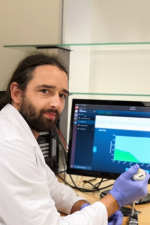Research focus
The Kristel Sleegers lab is committed to increase insight in the complex genetics of Alzheimer’s disease and to investigate the translational potential of genetic discovery. We use genetic-epidemiological methods and advanced genomic technologies to identify molecular mechanisms that can serve as future targets for early detection, prevention and treatment.
Techniques include 2 nd and 3 rd generation DNA and RNA sequencing on various biomaterials of a well-characterized locally ascertained study cohort, ranging from targeted through whole exome to whole genome sequencing and in situ sequencing, high-throughput association studies (both common and rare, SNP and CNV) on disease endpoints as well as intermediate and endophenotypes, identification of genetic factors that modify onset age, and polygenic risk profiling. We participate in numerous (inter-) national networks and consortia, to enhance gene identification, interdisciplinary gene characterization and early biomarker discovery.
 prof. Kristel Sleegers
prof. Kristel Sleegers
Genome-wide association studies (GWAS) have proven to be an excellent tool to locate new AD risk loci, but they are typically not sufficient to detect the actual risk variant(s)
in the locus, let alone their downstream effects.
Identification of alleles directly affecting disease risk, however, is key in understanding the molecular mechanisms through which risk genes are involved in AD. Due to their location in a functional domain, or their mutation mechanism,
these variants may shed light on the mechanism through which a gene is involved in AD, providing anchor points for downstream research. Epidemiological estimates of new risk genes, as well as genetic risk profiling become more precise once these underlying genetic risk variants are known.
Therefore, it is our priority to identify and characterize disease-relevant sequence variants in identified AD risk loci to enhance their translational potential, leveraging the strengths of our local cohort, in terms of its relative homogeneity, rich resources and close connections with clinicians.
My team previously detected a functional CNV in CR1 (Brouwers et al., 2012), rare deleterious variants in CLU leading to reduced CLU secretion (Bettens et al., 2012 & 2015), and rare predicted loss-of-function mutations in SORL1 (Verheijen et al., 2016) as significant risk factors for AD.
In ABCA7 we demonstrated rare predicted loss-of-function mutations that were subject to a natural rescue mechanism through alternative splicing, as well as a pathogenic expansion of a VNTR that strongly increases AD risk (
Cuyvers et al., 2015;
De Roeck et al., 2017 &
2018).
Current projects include an in-depth characterization of ABCA7 genetic variation at transcript level in AD; expression and splicing QTL analysis of novel AD risk loci in the frame of the European Alzheimer Disease Biobank (EADB) consortium GWAS project; whole exome sequencing of AD, MCI and intermediate phenotypes in the frame of the European Medical Information Framework for Alzheimer’s Disease Multimodal Biomarker Discovery study (EMIF-AD MBD); and identification of gene expression signatures of functional connectivity and cognitive decline.
Team

Kristel Sleegers
Full Professor UAntwerp, Expert Scientist VIB
Julie van der Zee
Staff Scientist
Fahri Küçükali
Post-Doctoral Researcher
Jasper Verwilt
Post-Doctoral Researcher
Lance Mulder
Post-Doctoral Researcher
Celeste Laureyssen
PhD student
Gonzalo Leguía Fauró
PhD student
Tijs Watzeels
PhD student
Lara De Deyn
Ph.D. Student
Nicole Wawrzyniak
PhD student
Tobi Van den Bossche
PhD student
Mandana Gheisari
PhD student
Ella Torbeyns
PhD student
Kato Nauwelaers
PhD student
Lien Schrooten
PhD student
Sara De Donder
PhD student
Simone Corbetta
PhD student
Jasper Van Dongen
Technician
Lauren Donche
Technician
Yadigâr Akbas
Master student
Geike Puts
Master student
Lauranne Van Thillo
Master student
Saar Depooter
Master student